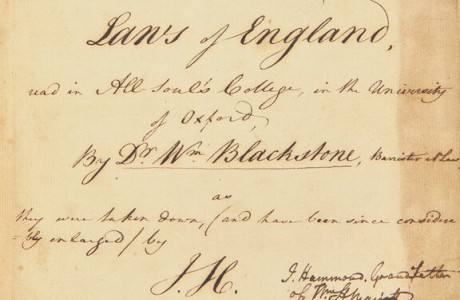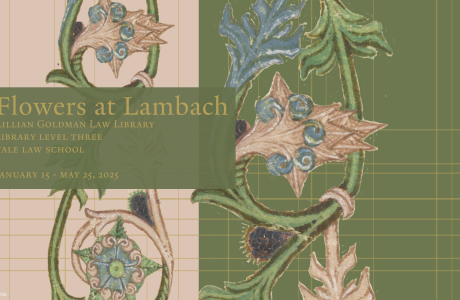Law Schools in Connecticut, 1782-1843: Americanizing the Common Law
In Connecticut and elsewhere, instructors in the proprietary schools played a crucial and self-conscious role in the Americanization of the common law. Applying practical experience, political beliefs, and the ideology of the American Revolution, they revised it to suit local circumstances and showed where it was incorrect, obsolete, or irrelevant. This is especially evident in their reception of Blackstone’s Commentaries. On a fundamental level they helped to de-Anglicize the law by teaching the positive and case law of their state.
Instructors in the Connecticut schools played a dominant role in this process, training dozens of men who became influential lawyers, judges, legislators, and teachers. Litchfield’s alumni list, our largest and most distinguished example, includes two vice-presidents, 101 United States congressmen, twenty-eight United States senators, six cabinet members, three United States Supreme Court justices, fourteen governors, thirteen chief justices of state supreme courts, and seventeen members of the Connecticut House of Representatives. Reeve, Gould, and Swift’s widely circulated treatises, all published versions of their lectures, were equally influential.

Benjamin Pomeroy (1787-1855), Manuscript notes of lectures by Sylvester Gilbert at his Law School in Hebron, Connecticut (c. 1811). [Image cropped.] Rare Book Collection, Lillian Goldman Law Library.
Instructors in the Connecticut schools rejected Blackstone’s unquestioned reverence for the common law. As we see in this lecture by Gilbert, they often subjected his doctrines to counterexamples drawn from natural, civil, and Roman law.

Tapping Reeve, The Law of Baron and Femme (New-Haven: Oliver Steele, 1816). [Image cropped.] Ownership signature of Isaac Leavenworth (1791-1864), a student at the New Haven Law School in 1822. Rare Book Collection, Lillian Goldman Law Library.
The first American treatise on family law, Reeve’s Law of Baron and Femme is a restatement of Blackstone’s Commentaries, Book I, Chapters XIV-XVII. It rejects some of the fundamental doctrines of the common law, most notably coverture. As Blackstone puts it, “the husband and wife are one person in law; that is, the very being or legal existence of the woman is suspended during marriage.” Reeve says the opposite. Also a prescriptive work, Baron and Femme aimed to liberalize the American law of domestic relations, arguing, for example, that married women were permitted to make wills, a point contradicted by the contemporary statute and case law of Connecticut and several other states.

Zephaniah Swift, A Digest of the Laws of the State of Connecticut (New-Haven: Printed and published by S. Converse, 1822-1823).
[Image cropped.] Rare Book Collection, Lillian Goldman Law Library.
Zephaniah Swift’s System of the Laws of the State of Connecticut, the first original American legal treatise, was highly regarded throughout the United States. Published on a subscription basis, its subscribers included George Washington, John Adams, Aaron Burr, James Kent, James Madison and other notables. Structured in the manner of Blackstone’s Commentaries, it presented an overview of the common law of Connecticut, and the common law generally, based on local court decisions and legislation. Swift’s Digest, a more ambitious work, is a complete recasting of the Commentaries. Though it referred to Connecticut law, the Digest addressed American law generally and was intended for a national audience. Both works were deeply influential and are still cited today.
– Notes by Michael von der Linn
“From Litchfield to Yale: Law Schools in Connecticut, 1782-1843,” curated by Michael von der Linn and Michael Widener, is on display through May 30, 2013, in the Rare Book Exhibition Gallery, Level L2, Lillian Goldman Law Library, Yale Law School.


